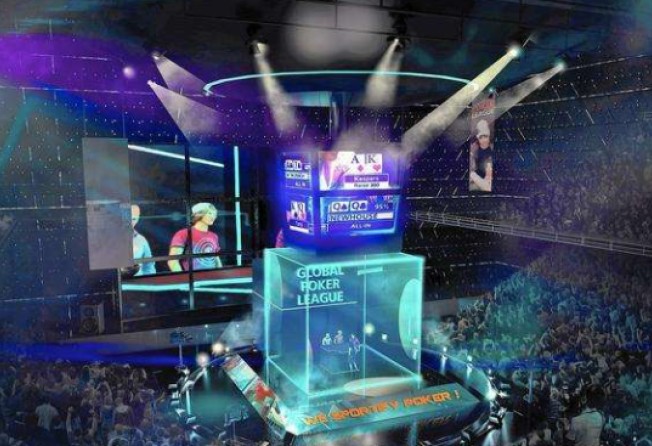
Is poker the next ‘sport’ to cash in on China’s booming sports economy? These investors are betting yes
Sina, plus Beijing and Hong Kong venture capitalists, among those going all-in on Mediarex Sports and Entertainment’s bid to make Global Poker League a hit in China

China’s attempt to create a massive domestic sports industry has sent huge waves through sport, media, business, and their intersections, Alibaba’s plan to spend US$100 million to establish rugby in the country just the latest example.
Everyone wants in, including non-traditional pursuits: many predict esports to be massive, for example.
Among the ‘sports’ betting big on China? Poker.
And it is a sport, insists French entrepreneur Alexandre Dreyfus. “It’s a mind sport, a skill game,” he says. “If you play one game only, there is a big luck element, but if you play regularly then it’s the skill that is predominant.
“Since four years ago when we bought the Global Poker Index [the world ranking of poker players] the same players are always at the top. Tournament poker is a competitive game and like esports, the poker we envision is being structured as a sport.”

Dreyfus’s firm, Mediarex Sports and Entertainment, has raised US$4.9 million from investors – Beijing-based Ceyuan Capital and Hong Kong’s Head and Shoulders Capital among them – to “sportify” poker and make it more audience friendly.
He hopes his Global Poker League (GPL), which has 72 players in 12 teams around the world, becomes the equivalent of the NBA or Champions League. China, of course, is a key market.
Head and Shoulders is run by Stanley Choi, one of the top poker players in Asia. He earned one of the biggest payouts of all time, US$6.4 million, in a tournament in Macau in 2012.
Mainland media firm Sina Sports is on board as “official digital media partner”. They plan to create a dedicated channel with tailor-made content to educate Chinese about the game, and to set up a mainland league with local teams. (Hong Kong has a team in the GPL, the Stars, who just qualified for the end-of-season playoffs).
“Texas hold’em is not part of the cultural roots of China,” admits Dreyfus, “but this has changed in the last few years thanks to the introduction of free poker applications on mobile phones.” He claims almost 100 million Chinese have downloaded these.
“Therefore, you have new generations of white-collar, educated and influential individuals that love the game and play regularly.
“Poker is first and foremost a game of skill, that involves mathematics and statistics. It is fair to say that Chinese are very skilled [in those] and therefore have potential to show to the world they’re better than other nations.”
Congrats to the Hong Kong Stars, qualified for the @GPL Playoffs. pic.twitter.com/01bgr5tsfU
— Alexandre Dreyfus (@alex_dreyfus) October 26, 2016
But surely the entire point of poker is gambling. That was its downfall when the US cracked down on websites during the first online poker boom; gambling is also illegal in China.
Dreyfus says GPL is different as players don’t wager, instead earning prizes for winning events and sharing in revenue.
“I would highly disagree that poker is just about money. You have dozens if not hundreds of millions of individuals in the world playing poker for fun on Facebook, mobile apps etc, and it’s not about money, it’s just a game like any other. The thrill of the game is to win and beat opponents.”
Dreyfus and his investors would not put a figure on how much they think China could be worth. There’s also plenty in the industry who believe GPL will never take off – anywhere.
Other efforts to turn poker into an event watched by millions have flopped, but Dreyfus and co. believe now the time is right, with live streaming, ubiquitous mobile phone penetration, etc.
The GPL has a number of innovations intended to make it more exciting and watchable, such as “The Cube”, where two players compete face-to-face on iPad-like machines in a soundproof glass box, allowing the live audience to see the exact state of play without alerting players.
“[Those] other initiatives were wrongly funded and conceived to be a quick sale,” says Dreyfus. “Sometimes people have the right idea at the wrong time, it was way too early.”
One of Dreyfus’ Hong Kong-based investors, who wished to remain anonymous, pointed to the thirst for new content on mobile and streaming platforms as key to his belief in the business case.
“I wouldn’t say this is a risky bet,” he said. “UFC didn’t take off until they tweaked the formula. Other televised poker formats didn’t take off until the hole cam showed audiences hidden cards. But the core elements are there and no-one else is really working on it other than GPL.
“On top of that, we are seeing new innovations beyond online and mobile video – I bet poker has a good shot at being a killer app for virtual reality.”
Is poker a sport? That’ll never be answered. Whether GPL’s China bet is a pair of aces or dead man’s hand should become clear soon enough.